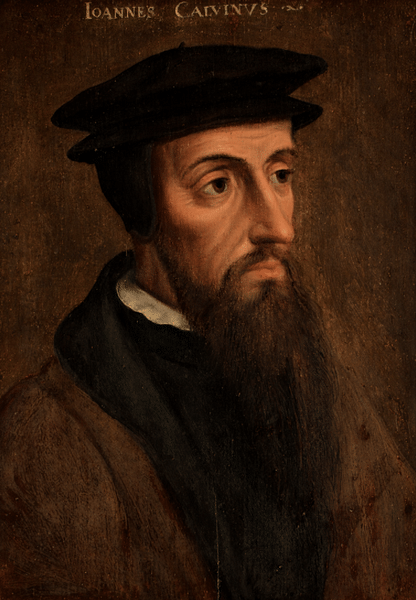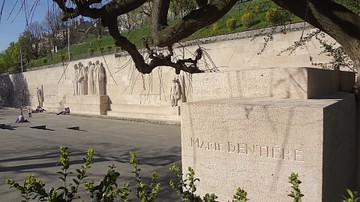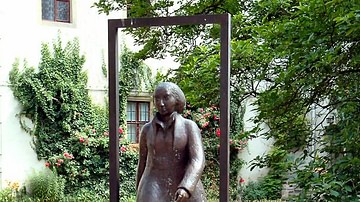The Protestant Reformation was a period of religious history marked by a great defining, debating, and divergence on what it meant to be an orthodox, faithful Christian. To this end, many theologians offered their own explanations of the fundamentals of the faith. The great reformed theologian, John Calvin (l. 1509-1564), presented in the Institutes of the Christian Religion (1536) profound elucidations of the tenets of Christianity, specifically on the topics of scripture, faith, sacraments, and the Holy Spirit.

The Word Revealed
Concerning scripture, Calvin states,
Scripture indeed is self-authenticated,” because “illumined by his [the Holy Spirit’s] power, we believe neither by our own nor by anyone else’s judgment that Scripture is from God; but above human judgment we affirm with utter certainty...that it has flowed to us from the very mouth of God by the ministry of men.
(Institutes, Calvin, 80).
In other words, for Calvin, the proof of the authority of scripture came from the Holy Spirit and not human agency. Therefore, it is impossible to empirically determine what was divinely inspired and what is not. All human attempts to prove or disprove Scripture are useless because truth (and the awareness of it) comes only from God. As Australian Anglican Bishop Palmer concludes, “It is quite true that Calvin asserts that God can be known through His creation (albeit imperfectly and only through faith) but it is only in Scripture that God is fully and clearly revealed” (Palmer, 31–32).
Calvin goes on to state that the church does have some authority but the ultimate authority rests in each believer’s Spirit-indwelt heart. Authentic proof of scripture comes from the recognition that “God in person speaks in it” (Calvin, 78) and is “a fit witness of himself in his Word” (79). Thus, although the physical church may be mistaken about the authority of some scripture, the universal church—i.e., the Elect—is not mistaken because the Holy Spirit is guiding their understanding. Because of this divine counsel, any texts that diminish or distort the image of God are not scripture as comprehended through the Holy Spirit working in the believer’s heart. In true scripture, “The undoubted power of his divine majesty lives and breathes there” (80)—not according to the “thralldom of superstition” (80) but according to “true doctrine” (80), which affirms God.
The Power of Faith
Calvin does not stop with scripture in his examination of the tenets of Christianity. Another important topic he addresses in the Institutes concerns faithfulness. Calvin tackles this important issue in a variety of ways. He first begins his examination with a simple, three-part definition consisting of God’s law for humanity, our inability to fulfill the law, and our rescue from eternal death through Jesus Christ, the Redeemer. Faith is the comprehension of humanity’s responsibilities, an admittance that humanity is unable on its own to meet them, and a confidence and hope that God will save the believer through Jesus Christ. To wit, Moody Bible Institute theologian Marcus Johnson states, “For Calvin, faith must come empty because it is of its very nature to receive, and of its highest purpose to be filled. Faith, therefore, has its true power and value determined entirely by its object—Jesus Christ” (Johnson, 43).
Expanding upon this understanding, Calvin states, “Faith rests not on ignorance, but on knowledge” (Calvin, 545), also that “Faith consists in the knowledge of God and Christ, not in reverence for the church” (545), furthermore, “There is a permanent relationship between faith and the Word” (548), and that to “take away the Word and no faith will then remain” (549). Truly, then, knowledge of God’s loving will and humanity’s weakened position is a quintessential part of the Christian faith. This knowledge will urge the believer “to seek God, not to shun him” (550), as imparted in the Word.
The Fear of God
The Word (and its message of God’s will) becomes a source for this knowledge and one where the believer can find assurance, confidence, and peace. This knowledge cannot be complete for humanity is hard-pressed in its finite nature to fully comprehend how God works, but humanity can have boldness “in divine benevolence and salvation” (561). This faith “renders the conscience calm and peaceful before God’s judgment” (561).
Although there is assurance of salvation, Calvin admits that the believer is still prone to conflict for the heart feels God’s greatness, love, and mercy while still perceiving humanity’s weakness, imperfection, and iniquity. This conflict, however, cannot destroy the faith of the believer for “The immeasurable cannot be comprehended by our inadequate measure and with our narrow capacities” (565). Moreover, the believer has the Word of God to protect them and to rest upon and with that, “Fear at once leads to assurance” (567). Calvin suggests that whatever inadequacies the believer may have are far over-shadowed by the great power of God’s loving will and Word. American historian VanderMolen states,
Calvin’s treatment of providence seems clearly deterministic: not only the general movement of history is planned and foreseen by God, but each particular incident within history is the result of God’s activity . . . Thus, according to Calvin, God acts in each occurrence in nature; nothing is left to chance and nothing is left to the will of other forces or beings.
(VanderMolen, 30)
The Sacramental Testimony
This great loving will of God is often exemplified in the sacraments of the Christian church. Rev. Richard Topping, Senior minister at the Church of St. Andrew and St. Paul in Montreal, notes,
No matter how we might try to specify and name the mystery of the operations of the grace of God in the Sacraments (and faith should seek understanding but also feel its limits); it is in the actual practice of the Lord’s Super and baptism that grace is powerful and effective in the life of God’s people.
(Topping, 37)
Calvin succinctly defined a sacrament to be "a testimony of divine grace toward us, confirmed by an outward sign, with mutual attestation of our piety toward him" (Calvin, 1277). Thus, baptism confirms our being divinely cleansed of all sins, communion demonstrates Jesus Christ's sacrifice for our salvation, etc. It is a promise-dialogue of sorts wherein the believer takes part in a holy activity and honors God for His promises and goodness in the present, past, and future. At the same time, God uses the sacraments to bolster the believer's faith, which being "slight and feeble unless it be propped up on all sides and sustained by every means, it trembles, wavers, totters, and at last gives way" (1278). Ultimately, the sacraments are for the Christians' benefit and edification.
As such, any imparting or experience of the sacraments that leads to confusion and misunderstanding is counter-productive. Calvin points out, “Papal tyranny involved a monstrous profanation of the mysteries” (1279) because their methodology did nothing to beget faith–one of the main purposes of the sacraments. In fact, the Catholic church’s presentation of the sacraments dangerously weakened many Christians’ faith because the sacraments were presented in a way that implied and even stated that the sacraments were seals of justification unto themselves.
According to Calvin, this was faulty thinking for how could “physical elements of the world” (1280) seal God’s promises, which are “spiritual and eternal?” (1280). Salvation comes from above, not below. The sacraments ought to be used alongside of the believer’s faith and not in front of it. They are a physical signification and identification of a great divine grace delivered to the believer, but they are not the essence of grace, itself. In other words, forgiveness comes from God—not from the baptismal waters. To place ultimate faith in the water and not God would be superstitious at best, idolatry and animism at worst.
The Transcendent Spirit
Calvin further supports this understanding when he comments on the Holy Spirit’s interaction with the sacraments. He states, “The sacraments properly fulfill their office only when the Spirit, that inward teacher, comes to them, by whose power alone hearts are penetrated and affections moved and our souls opened for the sacraments to enter in” (1284). Without the Holy Spirit preparing the way, the sacraments are only empty actions, void of meaning. In support, Notre Dame liturgical theologian Rozeboom asserts,
In his doctrine of the Lord’s Supper, John Calvin emphasizes that Christ truly nourishes the souls of believers with his body and blood. This transpires, says Calvin, virtute spiritus sancti—by the power of the Holy Spirit, who is the viniculum—the bond—between Christ and his own.
(Roozeboom, 16)
The Spirit provides the understanding and perception that makes the sacraments a helpful and healthful experience for the believer. It takes a natural activity “beyond the measure of nature” (Calvin, 1285) and “transmits those outward words and sacraments from our ears to our soul” (1286).
The Spirit, then, uses the sacraments as understood through the Word of God to not only confirm the Christian’s faith in God’s promises but also to enlarge that faith. A cultivation occurs where before, without the Holy Spirit’s presence, the seed of truth would never take root. However, if the truth of the sacraments “lights upon a soul cultivated by the hand of the Heavenly Spirit, it will be most fruitful” (1286). Therefore, the sacraments, through the work of the Holy Spirit, can be of great benefit and favor for the believer.
In Calvin’s examination of the Holy Spirit, he alludes to the fact that the Holy Spirit influences faith in life and ministry. The implications of this are important for if it is true then one cannot have eternal life or partake in God’s plan without the say-so of the Spirit. No doubt this influenced Calvin’s understanding of predestination and the Elect. Scriptures like Romans 14:23, Ephesians 2:8, and 2 Thessalonians 3:2 seem to agree with Calvin’s view for they suggest that lack of faith is an evil sin that separates man from God, and that having faith really is a divine gift leading to salvation. Basically, the Holy Spirit directly inspires, cultivates, and continues faith (or the lack thereof) for all humanity. As such, Amsterdam theologian Van Der Kooi notes, “God invites the human being by the power of his Spirit to the knowledge of him and he does so by a multitude of avenues and mirrors” (Van Der Kooi, 49).
Conclusion
The political and religious environs of Calvin—16th-century Europe—was turbulent and insecure, to say the least. Calvin’s personal history being raised in a staunch Catholic household definitely gave him an insider’s understanding of the doctrine and practices of the faith. That, coupled with a brilliant intellect, sincere piety, a lawyer’s mind for justice, and purist sense of reform, compelled Calvin to speak the truth of God to those he believed were living in the darkness or the shadows. Notre Dame Reformation scholar Randall Zachman remarks, “With regard to the knowledge of ourselves, we have seen that Calvin is profoundly aware of how easy it is to deceive ourselves about ourselves, and sought to lead us on the right path to the knowledge of ourselves” (Zachman, 194).
Thus, Calvin’s Institutes were written as a hopeful map for this right path, especially considering providence, the Sacraments, and the Holy Spirit’s guidance in the affairs of humanity. Despite sharp criticism of his controversial ideas, Calvin’s profound doctrinal declarations have influenced countless theologians, scholars, and Christians—both in his own time and until the present.








